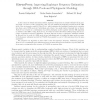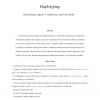116
click to vote
BMCBI
2008
15 years 1 months ago
2008
Background: The power of haplotype-based methods for association studies, identification of regions under selection, and ancestral inference, is well-established for diploid organ...
BMCBI
2008
15 years 1 months ago
2008
Background: Laboratory techniques used to determine haplotypes are often too expensive for large-scale studies and lack of phase information is commonly overcome using likelihood-...
BMCBI
2010
15 years 1 months ago
2010
Background: Haplotype-based approaches have been extensively studied for case-control association mapping in recent years. It has been shown that haplotype methods can provide mor...
BIOINFORMATICS
2007
15 years 1 months ago
2007
In the context of disease association studies, haplotype frequencies are usually estimated from genotype data. In order to reduce genotyping costs, one can estimate the haplotype ...
102
click to vote
ALGORITHMICA
2007
15 years 1 months ago
2007
— We present several new results pertaining to haplotyping. These results concern the combinatorial problem of reconstructing haplotypes from incomplete and/or imperfectly sequen...
103
click to vote
CSB
2004
IEEE
15 years 4 months ago
2004
IEEE
There is considerable interest in computational methods to assist in the use of genetic polymorphism data for locating disease-related genes. Haplotypes, contiguous sets of correl...
131
click to vote
CSB
2003
IEEE
15 years 6 months ago
2003
IEEE
The promise of plentiful data on common human genetic variations has given hope that we will be able to uncover genetic factors behind common diseases that have proven difficult ...
CSB
2005
IEEE
15 years 6 months ago
2005
IEEE
We study the parsimony approach to haplotype inference, which calls for finding a set of haplotypes of minimum cardinality that explains an input set of genotypes. We prove that ...


